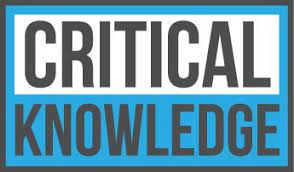In today’s digital era, we are constantly bombarded with information from various sources such as social media, news outlets, and online platforms. This abundance of information has led to what is known as the Information Age, where access to knowledge is easier than ever before. While this can be empowering, it also comes with its challenges, particularly in discerning what information is reliable and accurate. In this article, we will explore the importance of critical knowledge in navigating the Information Age.

The Rise of the Information Age
The Information Age, also known as the Digital Age or the Computer Age, is characterized by the rapid shift from traditional industry to an economy primarily based on information technology. This shift has been fueled by the proliferation of computers, smartphones, and the internet, which have transformed the way we communicate, work, and access information.
One of the defining features of the Information Age is the democratization of information. In the past, access to knowledge was limited to those who had access to libraries, books, and academic institutions. Today, information is accessible to anyone with an internet connection, leading to a more informed and interconnected society.
The Challenge of Information Overload
While the abundance of information has its benefits, it also presents challenges, chief among them being information overload. Information overload occurs when individuals are exposed to more information than they can process, leading to cognitive overload and decision paralysis.
In the Information Age, we are constantly bombarded with information from various sources, making it challenging to separate fact from fiction. This is compounded by the rise of fake news and misinformation, which can spread rapidly through social media and other online platforms.
The Importance of Critical Knowledge
In the face of information overload and misinformation, critical knowledge has never been more important. Critical knowledge refers to the ability to evaluate information objectively, discerning what is credible and what is not. It involves asking questions, challenging assumptions, and verifying sources before accepting information as true.
Critical knowledge is essential for several reasons. First, it helps us make informed decisions. In a world where misinformation is rampant, being able to critically evaluate information is crucial for making decisions that affect our lives, such as healthcare choices, financial investments, and political beliefs.
Second, critical knowledge is essential for academic and professional success. In an age where knowledge is easily accessible, the ability to think critically sets individuals apart. Employers value critical thinkers who can analyze information, solve problems, and make sound decisions.
Third, critical knowledge is essential for maintaining a healthy democracy. A well-informed citizenry is crucial for holding governments and institutions accountable. Critical thinkers are less susceptible to manipulation and propaganda, making them more likely to make informed decisions in elections and public debates.
Developing Critical Knowledge Skills
Developing critical knowledge skills is essential in navigating the Information Age. Here are some tips for developing critical knowledge skills:
- Verify Sources: Always verify the source of information before accepting it as true. Look for reputable sources and cross-reference information to ensure its accuracy.
- Question Everything: Adopt a skeptical mindset and question everything you read or hear. Ask yourself who benefits from the information and whether there is evidence to support it.
- Seek Multiple Perspectives: Seek out diverse perspectives on a topic to gain a more comprehensive understanding. Avoid echo chambers where only one viewpoint is presented.
- Stay Informed: Stay informed about current events and developments in your field of interest. Follow reputable news sources and fact-check information before sharing it.
- Be Open-Minded: Be open to changing your opinions based on new information. Avoid confirmation bias, which is the tendency to seek out information that confirms your existing beliefs.
- Practice Critical Thinking: Engage in activities that promote critical thinking, such as puzzles, debates, and discussions. Critical thinking is a skill that can be developed with practice.
Conclusion
In conclusion, critical knowledge is essential in navigating the Information Age. In a world where information is abundant but not always reliable, the ability to think critically is more important than ever. By developing critical knowledge skills, we can become better informed, make better decisions, and contribute to a more informed and democratic society.

